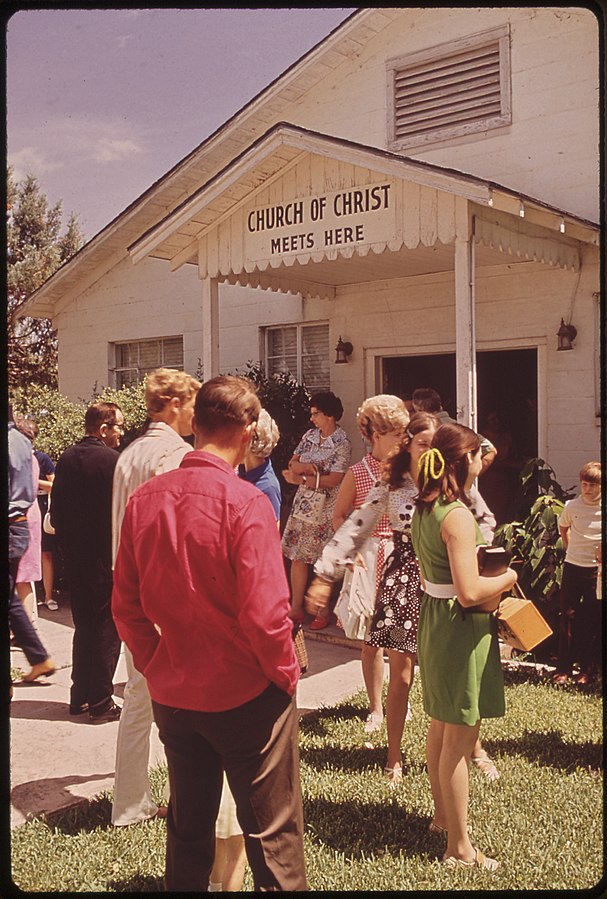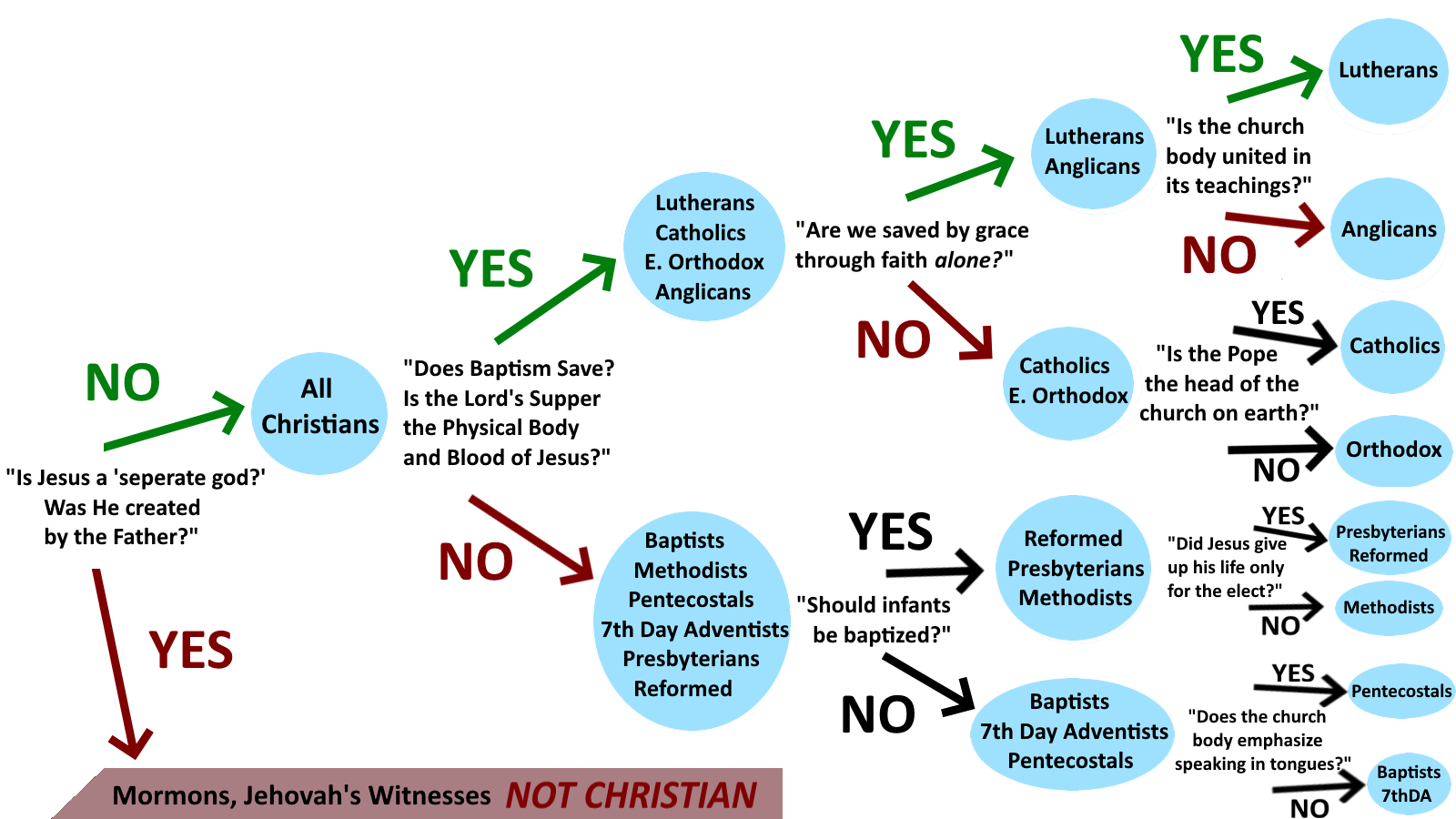What’s a Non-Denominational Christian?
“I have a relationship with Christ, but I’m not part of any religion or Christian denomination.”
This idea has grown more and more popular as the church in America has seen a rapid rise in “non-denominational” Christians. A non-denominational Christian is a Christian who does not align himself with a specific religious body (i.e. Lutheranism, Catholicism, Methodism). Most Christians who claim that they are non-denominational believe certain basics of the faith (the Bible is inspired by the Holy Spirit, Jesus did miracles, Jesus rose from the dead). However, besides these basic teachings, the non-denominational Christian is free to pick and choose what other teachings of the church he wants to believe.
In this way, non-denominational Christianity is very individualistic. After all, there is freedom in separating from the set beliefs of a mainline denomination and developing your own personal relationship with Jesus. Needless to say, as a Lutheran pastor, I see huge problems with this trend away from mainline denominations.
Problem #1: Know Less, Feel More

For example, I have yet to enter a non-denominational church where the Apostles and Nicene Creeds were read in worship. Perhaps there exist some, but I have not found any. Why is this? Reading out a creed in worship can be – for lack of a better word – boring. It is not exciting; it is not “emotion-evoking.” Therefore, many of these churches exclude it. But there are consequences to this – if the creeds are never read in worship, less and less Christians will learn the basic tenants of our faith. Scriptural illiteracy increases. And if Scriptural illiteracy increases, people will begin to believe doctrine contrary to the Word of God – contrary to Jesus!

Problem #2: Fake Unity
As mentioned prior, many Christians align themselves with certain church bodies. These are known as denominations. We at Grace Lutheran Church are, you guessed it, members of the Lutheran denomination. I have heard the argument from non-denominational Christians that denominations are negative because they divide up the Church. And I would agree that division in the Church is a negative. After all, read what Paul says in his letter to the Philippians:
So if there is any encouragement in Christ, any comfort from love, any participation in the Spirit, any affection and sympathy, complete my joy by being of the same mind, having the same love, being in full accord and of one mind (Philippians 2:1-2).
Non-denominational Christianity might then seem enticing because these divisions seem to be thrown away. “We are a unified church body – unified in Christ!” But these words are empty. In fact, I would argue that non-denominational Christianity encourages division, while mainline Christianity fights against it.
The entire premise of this “Christian unity” in non-denominational circles starts with this thought: “some Christian beliefs are more important than others.” “The doctrine of Baptism is not as important as Christ’s resurrection, so we allow different opinions.” “The doctrine of the Lord’s Supper is not important as believing the Bible is inspired, therefore we allow different interpretations of the Sacrament.” Are you starting the contradiction here? By allowing a congregation more freedom in many “less important” theological doctrines, you are filling a church with many people who disagree on many teachings of the church. Non-denominational Christians are unified by ignoring church teaching. It is a fake unity. When a church refuses to take a stance, it promotes division – not unity.
Problem #3: There is No Such Thing as a Non-Denominational Church

Let me give you an example. A member of a non-denominational church walks up to the pastor. “I just had a new baby girl! I would like her to be baptized.” How does that pastor respond? It all depends how he interprets Scripture. It is impossible to give an answer that does not align with a certain denominational tradition. If he believes that baptism is a gift that saves you, he will gladly baptize the little girl. That is not a “non-denominational” teaching. That is Lutheran, Catholic, Orthodox, Anglican, etc. If he believes that baptism is only an outward sign of faith, he will likely refuse. That is not a “non-denominational” teaching. That is Baptist, Pentecostal, etc. If he refuses to say one way or the other, he is still effectively refusing (as his refusal to proceed would imply the belief that he does not believe Baptism is so important that it is salvific) and aligning himself with the Baptist and Pentecostal traditions.
There’s no way out. Every church is aligned with a certain Christian denomination because every church must practice its faith. Theological decisions will need to be made. Some churches baptize infants. Others do not. It is impossible for a “non-denominational church” to be “open to both” without making a stance. At the end of the day, a decision must be made. And the result of your decision associates you with a certain Christian denomination.
A Brief Explanation of Denominational Differences
For the sake of brevity, I have created a chart to explain some of the more obvious differences between Christian denominations. Let me be clear, this is not even close to an exhaustive list of the differences between denominations. It also includes vast oversimplifications. I am assuming that all Christians in the set denominations share the same doctrinal views (they do not, aside from confessional church bodies like LCMS Lutherans). I am also assuming that all these denominations are united on their views of the inerrancy of Scripture (they are not, for example – LCMS Lutherans and ECLA Lutherans are vastly different church bodies in terms of this doctrine).
But that aside, I hope this chart demonstrates that it is impossible to be a “non-denominational” Christian. You have to answer “yes” or “no.” If a church does not baptize infants, they have made a decision that aligns them with a certain church denomination.



